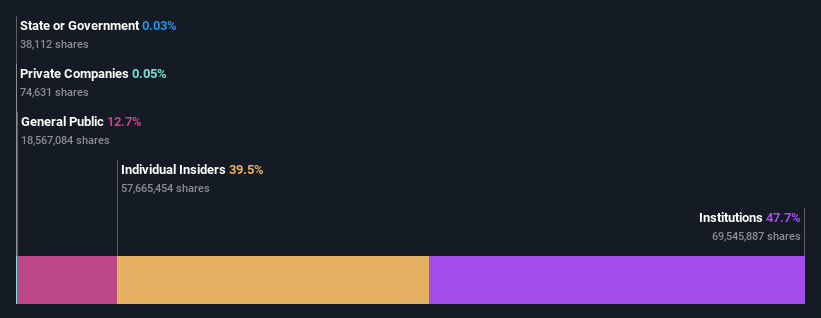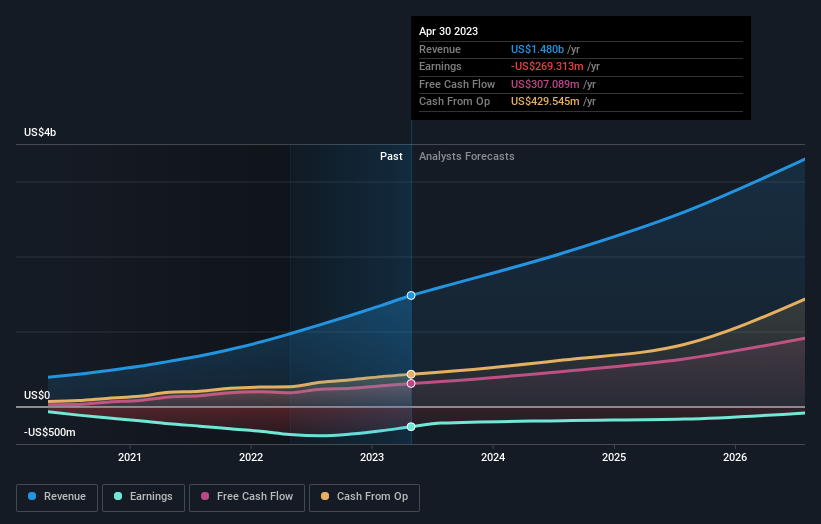Zscaler, Inc.'s (NASDAQ:ZS) one-year returns climbed after last week's 4.9% gain, institutional investors must be happy
Key Insights
Significantly high institutional ownership implies Zscaler's stock price is sensitive to their trading actions
51% of the business is held by the top 5 shareholders
To get a sense of who is truly in control of Zscaler, Inc. (NASDAQ:ZS), it is important to understand the ownership structure of the business. With 48% stake, institutions possess the maximum shares in the company. In other words, the group stands to gain the most (or lose the most) from their investment into the company.
And things are looking up for institutional investors after the company gained US$1.1b in market cap last week. The one-year return on investment is currently 3.2% and last week's gain would have been more than welcomed.
Let's delve deeper into each type of owner of Zscaler, beginning with the chart below.
View our latest analysis for Zscaler
What Does The Institutional Ownership Tell Us About Zscaler?
Institutions typically measure themselves against a benchmark when reporting to their own investors, so they often become more enthusiastic about a stock once it's included in a major index. We would expect most companies to have some institutions on the register, especially if they are growing.
We can see that Zscaler does have institutional investors; and they hold a good portion of the company's stock. This implies the analysts working for those institutions have looked at the stock and they like it. But just like anyone else, they could be wrong. It is not uncommon to see a big share price drop if two large institutional investors try to sell out of a stock at the same time. So it is worth checking the past earnings trajectory of Zscaler, (below). Of course, keep in mind that there are other factors to consider, too.
Hedge funds don't have many shares in Zscaler. Our data shows that Ajay Mangal is the largest shareholder with 20% of shares outstanding. With 18% and 5.7% of the shares outstanding respectively, Jagtar Chaudhry and The Vanguard Group, Inc. are the second and third largest shareholders. Jagtar Chaudhry, who is the second-largest shareholder, also happens to hold the title of Chief Executive Officer.
Our research also brought to light the fact that roughly 51% of the company is controlled by the top 5 shareholders suggesting that these owners wield significant influence on the business.
While studying institutional ownership for a company can add value to your research, it is also a good practice to research analyst recommendations to get a deeper understand of a stock's expected performance. Quite a few analysts cover the stock, so you could look into forecast growth quite easily.
Insider Ownership Of Zscaler
The definition of company insiders can be subjective and does vary between jurisdictions. Our data reflects individual insiders, capturing board members at the very least. Management ultimately answers to the board. However, it is not uncommon for managers to be executive board members, especially if they are a founder or the CEO.
Most consider insider ownership a positive because it can indicate the board is well aligned with other shareholders. However, on some occasions too much power is concentrated within this group.
It seems insiders own a significant proportion of Zscaler, Inc.. Insiders own US$9.4b worth of shares in the US$24b company. That's quite meaningful. It is good to see this level of investment. You can check here to see if those insiders have been buying recently.
General Public Ownership
The general public, who are usually individual investors, hold a 13% stake in Zscaler. While this size of ownership may not be enough to sway a policy decision in their favour, they can still make a collective impact on company policies.
Next Steps:
It's always worth thinking about the different groups who own shares in a company. But to understand Zscaler better, we need to consider many other factors. Consider risks, for instance. Every company has them, and we've spotted 3 warning signs for Zscaler you should know about.
If you would prefer discover what analysts are predicting in terms of future growth, do not miss this free report on analyst forecasts.
NB: Figures in this article are calculated using data from the last twelve months, which refer to the 12-month period ending on the last date of the month the financial statement is dated. This may not be consistent with full year annual report figures.
Have feedback on this article? Concerned about the content? Get in touch with us directly. Alternatively, email editorial-team (at) simplywallst.com.
This article by Simply Wall St is general in nature. We provide commentary based on historical data and analyst forecasts only using an unbiased methodology and our articles are not intended to be financial advice. It does not constitute a recommendation to buy or sell any stock, and does not take account of your objectives, or your financial situation. We aim to bring you long-term focused analysis driven by fundamental data. Note that our analysis may not factor in the latest price-sensitive company announcements or qualitative material. Simply Wall St has no position in any stocks mentioned.

 Yahoo Finance
Yahoo Finance 

